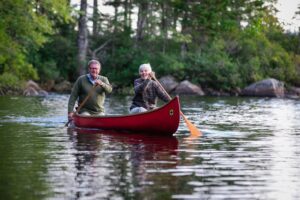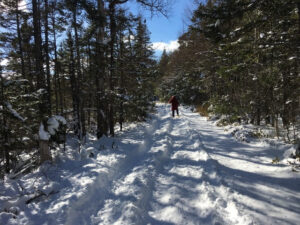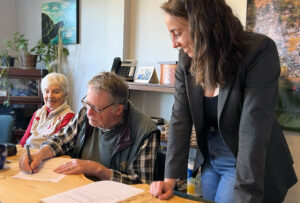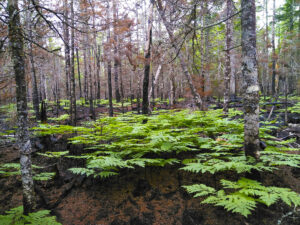Protecting the borders of the Blue Mountain Wilderness
01 Feb 2024
Thanks to the generosity of two long-time Nature Trust supporters, we are proud to announce more protected land in the Blue Mountain-Birch Cove Lakes region. In November 2023, Donald (Don) and Joleen (Jo) Gordon signed a conservation easement to protect 109 acres of their property forever, while still allowing them to enjoy a place that has been precious to them for more than fifty years.
The newly protected land lies on the northeastern shore of Cox’s Lake near Hammonds Plains. It complements the growing assemblage of protected lands in the Blue Mountain-Birch Cove Lakes area, including the Blue Mountain-Birch Cove Lakes National Urban Park candidate site.

Don and Jo paddling out from the property on Cox’s Lake at the celebration of their 50th wedding anniversary. Photo credit: Kate Hayter.
The property has belonged to Don and Jo Gordon since 2002, but their history with it goes back much further. Don came to Halifax from Rhode Island in 1965 to pursue his PhD in oceanography with Gordon Riley, who had just been recruited to lead Dalhousie University’s Institute of Oceanography. “That’s where Jo and I met, in the Forrest Building at Dal,” Don recalls, where Jo was completing her honours degree in biology. Within a year of moving to Nova Scotia, Gordon and Lucy Riley bought the property in Hammonds Plains and put in a road and built a seasonal home. They encouraged oceanography students to visit and enjoy cross-country skiing, hiking, and canoeing. Especially popular was the canoe route from Cox’s Lake through a series of portages and lakes down to Fraser’s Lake in Timberlea. “We were impressed to have such wild land so close to the city,” Don says.
After completing their degrees and getting married, the Gordons spent two years working at the University of Hawaii. Upon return to Nova Scotia in 1970, Don began working as a research scientist at the Bedford Institute of Oceanography while Jo became a volunteer research associate at the Nova Scotia Museum. Don’s research focused on studying the impacts of human activities on marine ecosystems, and later included water quality studies of Halifax Metro Area lakes, while Jo’s work documented numerous traditional crafts with a focus on basketry.

Jo cross-country skiing on Riley Road. Photo credit: Don Gordon.
They continued to regularly visit the Rileys’ land for various outdoor activities, in time with their two daughters. After Gordon Riley died in 1985, they started looking after the property so that Lucy could continue to enjoy it. They too used it as natural retreat from the city to share with family and friends. Jo also used it to host numerous basketry workshops. In 2002, when Lucy turned 90, the Gordons bought the property from her.
“The Rileys had hoped to keep the land in a wild state for as long as possible, and we shared that vision as well,” Don continues. “We first sat down with the Nature Trust about four years ago and looked at different options for protecting the property. We wanted to be able to continue using it as a wilderness retreat and the conservation easement seemed the best way to go. All of our neighbours are very pleased and one hundred percent on board with our decision, for they want to see the land stay as it is.” The Rileys’ daughters also told the Gordons that it is exactly what their parents would have wanted. “We see our decision as a tribute to the Rileys for bringing me with them to Halifax, which had a huge and most positive impact on our lives, for which we are so grateful.”

The Gordons came to the Nature Trust office in November 2023 to sign and celebrate the conservation easement. Jo (left) and Megan Pagniello (right), the Nature Trust’s Land Conservation Lead, look on as Don (centre) signs the documents.
The land was primarily forested, but about two-thirds of the property was badly burned in the fires of summer 2023. Don notes that “We’re very thankful for the efforts to contain the fire. The firefighters were able to keep it on the north side of Riley Road, so it never crossed the road or the power line. It could have been much worse. The only damage was to the woodland, and we know it will come back in time. We’re delighted with the possibility of reforestation taking place to speed up that process.” As part of the assessment process for the easement (before the fires), the Nature Trust conducted a survey of the species present on the land, and Don adds that “it’s really nice to have a record of what the property was like at that time. The habitat has changed, so some species may become less abundant but others may become more abundant.”

Cinnamon Ferns are a vanguard of regrowth in the post-fire ecology of the land.
The property is bordered to the south by the provincially designated Blue Mountain – Birch Cove Lakes (BMBCL) Wilderness Area, part of the growing assemblage of lands proposed to become a National Urban Park. For the past four years, Don has been an active member of the Friends of Blue Mountain-Birch Cove Lakes, which is a community group advocating park creation. “Our land will not formally be part of the park but it will serve as a buffer and informally extend the park boundary,” he says.
“When we first started going out there in our student days, I can remember saying, ‘This should become a park someday.’ And now fifty years later, it is very gratifying to see this happening.”
Don and Jo have included the Nature Trust in their wills and were inducted into the Nature Trust’s “Legacy Circle” in 2023. Their social circle includes numerous close friends from their Dalhousie student days, many of whom were and continue to be foundational supporters of the Nova Scotia Nature Trust.
The conservation easement was donated to the Nature Trust through the Canadian Ecological Gifts program (Ecogifts), which offers significant tax incentives for gifts of ecologically important land. This tax credit is the only financial compensation the Gordons received for the gift of their land, and we are so grateful for their generosity in doing so.
In order to ensure the Nature Trust’s promise of forever wild, even donated land requires significant financial support. This support, whether provided through individual donations or funding partners, allows the Nature Trust to carry out surveys, appraisals, ongoing land stewardship, and more.
This project was undertaken with the financial support of the Government of Canada through the federal Department of Environment and Climate Change.
Our thanks as well for the generous support from the Nova Scotia Crown Share Land Legacy Trust.


